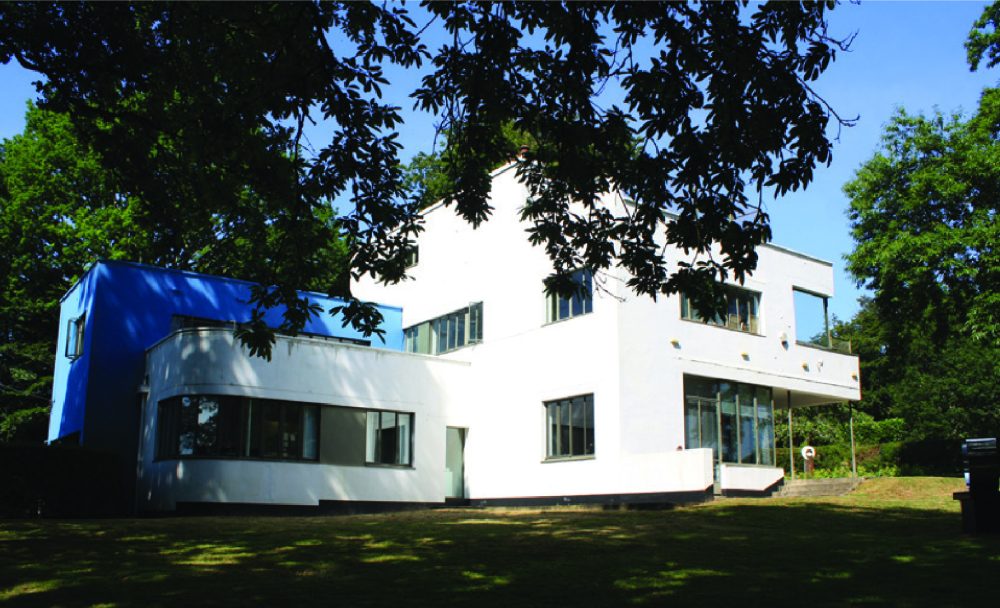Dartington Hall
Developments
At the same time as the Science Walden Project was developing, in the summer of 2016, Dartington advertised for tenants for High Cross House on the Estate. This iconic modernist House, built in the International Style in 1932 for the new Headmaster of the Dartington School, had quite a troubled history and had a variety of uses over time.
The House was built by a builder highly expert in traditional building styles, but lacking the necessary knowledge to construct a modern building with flat roofs. As a result, it had suffered badly from leaks and was in poor condition. A partial restoration in the 1980s allowed the House to be used as the home for the Dartington Archive but when this was moved offsite to the Devon Archive the House once again fell into disrepair.

Proposal for use of High Cross House
In 2011 it was leased by National Trust as an experimental gallery and artist residency space; the National Trust spent money improving the condition of the House and equipped the ground floor as a gallery space. However, a change of Regional Manager led to the tenancy being abandoned in 2013 and the House once again went dormant.
The National Trust used the ground floor of High Cross House as a gallery. Photo Clive Adams.
Rhodri Samuel became the new CEO of Dartington in 2015, determined to reclaim Dartington’s modern history including reclaiming and finding a new use for High Cross House. Calls for its use were invited and Richard submitted a proposal on behalf of art.earth and CCANW in association with Schumacher College to establish an International Centre for Ecological Arts and Radical Thought, supported by a letter from Sir Nicolas Serota, Director of Tate.
A meeting of Dartington representatives and other interested parties was held in November 2016 at the House at which Richard and Clive made a presentation and it looked like this might be a viable opportunity. The House, however, needed a great deal of money spending on it but we were unable to begin the fundraising process without a firm commitment. Ultimately the Trust took the decision to hold any use of the House in abeyance until funding to restore it was available. Some seven years later the house remains unrestored but stabilised and is now once again being used as a place of learning.
This was not the first time that CCANW had approached Dartington about the potential of using High Cross House (it has done so in 2001, 2005 and 2013) but none of these approaches bore fruit. Coincidentally, in 1967 Dartington’s co-founder Leonard Elmhirst had expressed interest in establishing an outpost of Dartington at Dunsland, the first possible location investigated as a base for CCANW in 1996.
From the perspective of 2023, much of Rhodri Samuel’s vision for the ‘new’ Dartington has come to pass. Education is now once again at the core of the Estate even if philosophically the role of education is very different from the model based on the thinking of Rabindranath Tagore when education was first introduced to Dartington in the 1930s by the Elmhirsts. Then, education was seen as part of a way of being where physical labour, learning and recreation were all seen as equal components to an ‘Abundant Life’.
Today the calculus seems rather more transactional, particularly as both the higher education bodies on the Estate – Schumacher College and Dartington Arts School both rely entirely on fees from students. These institutions are private and independent and thus differ considerably from the former Dartington College of Arts which was state supported.
Nevertheless, the education programme has grown and flourished over the past few years. Schumacher College has updated and extended its courses and changed its fee model (by reducing fees by approximately 50%) and this has proved successful in attracting a larger and more diverse student body. There is also now a course specifically with an arts remit as part of their offer, Movement, Mind and Ecology.
The new Dartington Arts School was created in 2021 as a vehicle for a platform of new postgraduate degrees, which now (2023) include Reimagining Performance Practice, Poetics of Imagination, Cultural Production, Arts & Ecology and Arts & Place. There are reportedly plans to launch an undergraduate programme as well but this has not been announced as yet.
Alan Boldon became Dartington’s Executive Director of Learning in 2018 and after Rhodri Samuel left in 2019 Alan took on the role of Chief Executive Officer in 2021. Alan’s history with Dartington includes a time at the College of Arts within the Arts Management programme. He subsequently developed the first MA Arts and Ecology and led this 2006-8.
Once it was announced that the College of Arts would ultimately be subsumed by Falmouth University (including the discontinuation of the MA Arts and Ecology) Alan moved and became a member of the Faculty at the University of Brighton where he remained until his return to Dartington under Rhodri. He has been responsible for leading on the vision for the new Arts School and has co-designed many of the new courses.
Richard Povall and Clive Adams.
Next Page
Pros and Cons
